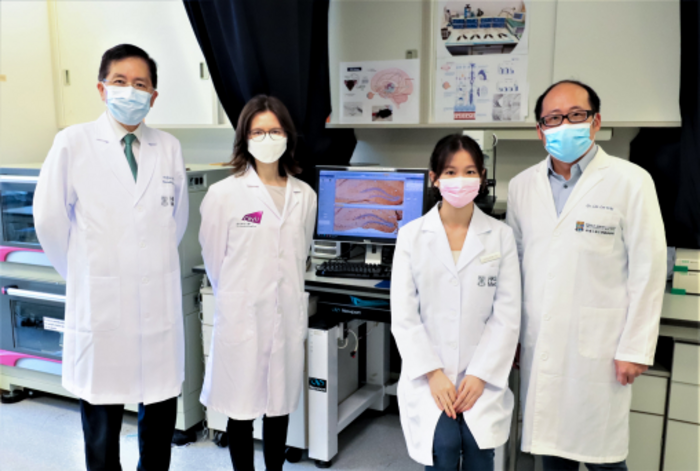A joint research team from the LKS Faculty of Medicine, The University of Hong Kong (HKUMed) and City University of Hong Kong (CityU) has discovered that the electrical stimulation of the eye surface can alleviate depression-like symptoms and improve cognitive function in animal models. These significant findings were recently published in Brain Stimulation [link to publication] and the Annals of the New York Academy of Sciences [link to publication].

Credit: The University of Hong Kong
A joint research team from the LKS Faculty of Medicine, The University of Hong Kong (HKUMed) and City University of Hong Kong (CityU) has discovered that the electrical stimulation of the eye surface can alleviate depression-like symptoms and improve cognitive function in animal models. These significant findings were recently published in Brain Stimulation [link to publication] and the Annals of the New York Academy of Sciences [link to publication].
Background
Major depression is the most common and severe psychiatric disorder across the world. Recently, the World Health Organization reported1 that the COVID-19 pandemic had triggered a massive increase in the number of people with anxiety and depression. About a quarter of patients do not respond adequately to the treatments available.
Dr Lim Lee Wei, Assistant Professor in the School of Biomedical Sciences, HKUMed and a former Lee Kuan Yew Research Fellow in Singapore, reported in 2015 that deep brain stimulation of the prefrontal cortex in the brains of animals could improve memory function and relieve depressive symptoms. These therapeutic effects were attributed to the growth of brain cells in the hippocampus, a region of the brain known to be involved in learning and memory function. However, this technique, also known as deep brain stimulation, is invasive and requires surgery to implant electrodes in the brain, which may cause side effects such as infections and other post-operative complications.
Research findings and significance
A team of Hong Kong researchers headed by Dr Lim Lee Wei; Dr Leanne Chan Lai-hang, Associate Professor in the Department of Electrical Engineering, CityU; Professor Chan Ying-shing, Dexter H C Man Family Professor in Medical Science, Professor of the School of Biomedical Sciences, Associate Dean (Development and Infrastructure), HKUMed, and Director of the Neuroscience Research Centre, HKU, have been looking for alternative ways to treat neuropsychiatric diseases. They discovered that the non-invasive stimulation of the corneal surface of the eye (known as transcorneal electrical stimulation, or TES) that activates brain pathways, resulted in remarkable antidepressant-like effects and reduced stress hormones in an animal model for depression. Furthermore, this technique induced the expression of genes involved in the development and growth of brain cells in the hippocampus.
In related experiments, Yu Wing-shan, PhD student, and other research members from the School of Biomedical Sciences, HKUMed, investigated whether this approach could be used to treat Alzheimer’s disease, a common type of dementia with no definitive cure. They found that this non-invasive stimulation in mice drastically improved memory performance and reduced beta-amyloid deposits in the hippocampus, which is one of the hallmarks of Alzheimer’s disease.
Dr Leanne Chan Lai-hang, an expert on the electrical stimulation of visual and non-visual brain targets, described this research, ‘Transcorneal electrical stimulation is a non-invasive method initially developed to treat eye diseases, and it would be a major scientific breakthrough if it could be applied to treat neuropsychiatric diseases.’
‘These research findings pave the way for new therapeutic opportunities to develop novel treatment for patients suffering from treatment-resistant depression and dementia. Nevertheless, clinical trials must be conducted to validate the efficacy and safety,’ remarked Professor Chan Ying-shing.
About the research team
The research was led by Dr Lim Lee Wei, Assistant Professor of the School of Biomedical Sciences, HKUMed and a former Lee Kuan Yew Research Fellow in Singapore; Dr Leanne Chan Lai-hang, Associate Professor in the Department of Electrical Engineering, CityU; Professor Chan Ying-shing, Dexter H C Man Family Professor in Medical Science, Professor of the School of Biomedical Sciences, Associate Dean (Development and Infrastructure), HKUMed, and Director of the Neuroscience Research Centre, HKU; and conducted at the Neuromodulation Laboratory (www.drlimlab.com) at HKU in collaboration with CityU at the Neural Interface Research Laboratory (www.ee.cityu.edu.hk/~lhchan). Yu Wing-shan was the main researcher. She is a recipient of a prestigious Hong Kong PhD Fellowship, awarded by the Hong Kong Research Grants Council.
Acknowledgments
These scientific works were supported by the General Research Fund of the Hong Kong Research Grants Council (No. 17119420, and No. 11208218), the Fund for Basic Research (No. 201811159133 and No. 201910159163) and for Translational and Applied Research, No. 201910160010); and the Strategic Research Fund at CityU (No. 7005632).
Media enquiries
Please contact LKS Faculty of Medicine of The University of Hong Kong by email ([email protected]).
Journal
Brain Stimulation
DOI
10.1016/j.brs.2022.05.018
Method of Research
Experimental study
Subject of Research
Cells
Article Title
Antidepressant-like effects of transcorneal electrical stimulation in rat models
Article Publication Date
27-May-2022




